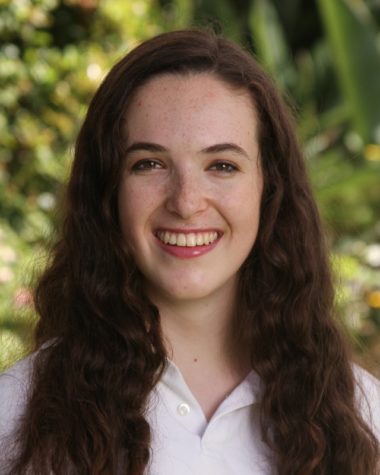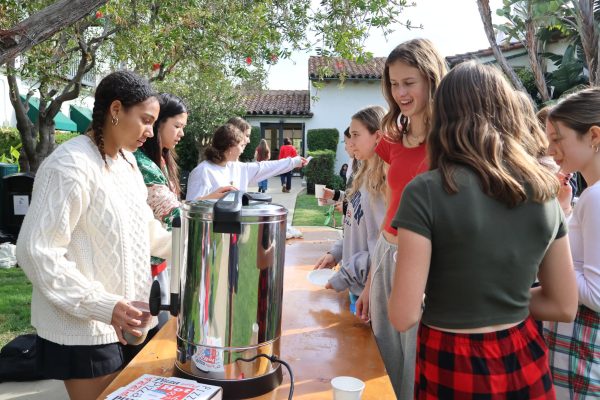Archer goes green with Council of Sustainability
Photo credit: Eloise Rollins-Fife
Junior Ruby Krull leads a meeting of the environmental health ACS subgroup, which focuses on promoting an environmentally conscious lifestyle. The group is one of four subcommittees that make up the larger council.
According to its website, environmental sustainability is of great importance to Archer’s mission.
The statement reads, “The Archer School for Girls is committed to meeting its existing needs without compromising the ability of future generations to meet their needs…We strive to use our resources efficiently, create a healthy school environment, foster an ecological curriculum, and educate members of the community to reduce our environmental footprint.”
But who assures that these principles are effectively implemented? That’s where the newly formed Archer Council of Sustainability [ACS] comes in.
The ACS started in the fall of 2015 as a faculty-only committee created to “run and oversee sustainability measures/initiatives on the Archer campus,” according to the Archer website. In the spring of 2016, six student leaders piloted a student committee, and this fall, the official ACS executive board and subcommittees formed.
“This is our first official year,” Leyla Namazie ’17, an executive board member who oversees the Water subcommittee, said. “We were kind of in the making last year.”
“I was trying to think of a way to create the greatest amount of change with the least amount of effort on my part,” Sustainability Coordinator and science teacher Cushman Gillen said. “So instead of me trying to do everything, I thought a lot of these initiatives should come from students to begin with. In 2015, I brought in four teachers and six students as kind of a trial period to see how the format would work, but then this year we opened it up to the whole upper school, and actually had an official application process.”
The executive board consists of four students and seven faculty members and is chaired by Gillen. Each student member then leads a subcommittee made up of interested student volunteers. Namazie leads the water group, Claire Bardin ’18 leads the waste group, Portia Freeman ’18 leads the energy group and Ruby Krull ’18 leads the environmental health group.
“[Our goal is to] make Archer a more sustainable campus,” Namazie said. “We really like to focus a lot on the culture of environmentalism and changing how people think of sustainability and what they think of when they [picture] being environmentally cautious and aware.”
Much of the council’s work goes into educating the community.
At one of the environmental health group’s meetings, members spent their time discussing issues surrounding food production and factory farming, researching facts to support their claims and brainstorming possible outlets for advertising their message to the school at large.
“We need to be able to limit or reduce our impacts, and if we can do that on a school campus and we can educate each other and educate ourselves, that will lead into our family lives and our everyday lives,” Gillen said. “Building those fundamentals and seeing them in action now, that’s where I believe the change starts, and it’s gonna build its way up. If you don’t have that foundation when you’re young, it’s a lot harder to begin later on.”
When the ACS isn’t focusing on current community engagement, they are designing Archer’s sustainable future through contributions to the new campus plan.
“With the reconstruction coming, [the council] wants to make sure that everything being done is as sustainable as possible,” Namazie said. “So, we’re looking into bathrooms and toilets and how much water they’re using, and sinks — how much water they’re releasing — and even the plants — how much water they intake. It’s a lot on water. But also waste and pollution and general ecosystem health.”
Gillen’s “ideal sustainable campus” would include many unique components all created with a common goal of long-term environmental health and consciousness.
“[Ideally,] the physical campus itself is as sustainable as possible — the buildings, the grounds, the physical plants,” he said. “Then, what we teach is [rooted] in sustainable practices or ecological literacy, and student driven in terms of different initiatives or programs we run on campus. The food needs to be sustainable as well. And all of those things [would then] join together with the same sort of purpose and [an] understanding that we need to be able to do things on this campus that can be essentially done forever without harming the environment.”
The ACS isn’t the only outlet for environmental enthusiasts on Archer’s campus this year. New to the 2016-2017 upper school course list is “Sustainable Living and Design,” an interdisciplinary class of Gillen’s own design offered to 11th and 12th graders to replace “Environmental Science” in the curriculum. Additionally, the redesigned Archer garden gives students hands-on experience with natural and sustainable growing practices.
“[Environmentalism is important because] of the obvious reasons — you know, environmental health, the future of our planet and everything,” Namazie said. “There’s a lot of [other reasons] — if you’re an animal lover, there’s obviously the concern for animals’ survival. There’s also just the idea that around the world, by conserving water, we could be helping people besides ourselves. We’re really privileged, so we get a lot of water and electricity when we want it, but if we were to learn to save and conserve and be sustainable, we could help other places, too.”
She continued, “I also just think it helps create a better atmosphere. I mean, I get really happy after I do something on ACS. It just makes you feel better to know that you’re contributing to something good.”

Eloise Rollins-Fife joined the Oracle staff in 2015 and was promoted to co-Voices editor in 2016. She became the Managing/News & Features Editor for...









Cat Oriel • Jan 31, 2017 at 12:42 am
Awesome article, Eloise! Sounds like the ACS is doing really great work for our community
Alexandra Chang • Jan 30, 2017 at 12:52 pm
Great article! Thank you for writing about the Council of Sustainability! I love that Archer is teaching students how to go green.